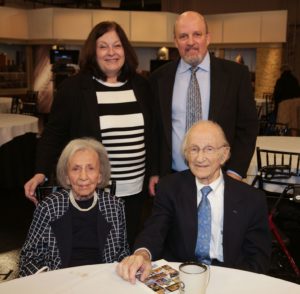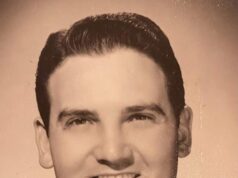


An ‘Abundance of Goodness’
In Memory of KET’s First Lady, Lillian Press
By KEVIN NANCE
When Gov. Andy Beshear announced the coronavirus-related death of Lillian Press—perhaps best known as the “first lady” of Kentucky Educational Television due to her long marriage to KET founder O. Leonard Press—on April 27, the normally stoic Beshear struggled to hold back tears.
Beshear noted that Press had spent many years as a fierce advocate for mental healthcare in Kentucky and later developed the Governor’s Scholars Program, a summer institute for Kentucky’s most gifted high school seniors that she later expanded into a network of similar programs in dozens of other states.



“It would change the course of how I felt about myself and how I interacted with others,” said Beshear, his voice cracking. He was proud, he said, of having been the first Governor’s School graduate to become governor of Kentucky—a fact that Press, who was 95 when she died, had lived to witness. “This was a friend of mine,” he said.
He wasn’t alone. The Presses were a beloved power couple and cultural mainstay in the Bluegrass State for more than half a century. In addition to being a skilled administrator, she was also—especially in later life—a born recruiter and behind-the-scenes organizer, enrolling and uniting people around common interests and causes, from the Westmoreland Neighborhood Association (whose newsletter she wrote for more than a decade) to the Women’s Network, which she started in 2003 to encourage civic and political engagement by women. As she put it in an oral history interview with Sarah Milligan for the Kentucky Historical Society in 2011, “It takes someone to draw people together.”
Someone, as she might have added, like herself. Standing south of five feet tall, Lillian Press—”Lil” to her close friends, though privately she preferred to be called Lillian—was a compact powerhouse who exuded charisma, confidence, and commitment. Although she retained her Hahvahd Yahd accent —she was from Everett, Massachusetts, a small town north of Boston — she spent most of her life as an advocate for progressive causes in Kentucky.



“She was like a little giant,” recalls her friend Janet Holloway, founder of the networking group Women Leading Kentucky. “She had a directness that I associate with New England, a very strong, positive attitude. Once she made up her mind that something was important, she went after it. If she believed in something that you believed in and she came to your board meeting, you could count on her. She was this tiny little woman with so much strength. I absolutely adored her.”
It helped that Press and her husband were impressively well-connected. In the KHS interview, with Len Press in the room, she marveled at the far-flung achievements of their social circle in Lexington in the early 1960s—a high-powered group that included Howard Bost, Nick Pisacano and Joseph Hamburg, all healthcare stars with local, state, and national profiles, and John Whisman, who helped establish both the Area Development Districts and the Appalachian Regional Commission. Friends of hers and her husband’s helped start not only KET but PBS and NPR. Gov. Martha Layne Collins was a pal, as was her former ARC boss and “Comment on Kentucky” host Al Smith. “It was like Gertrude Stein in Paris,” Press tells Milligan. “It wouldn’t happen today.”
She was a liberal Democrat who tempered her idealism with a gimlet-eyed realpolitik. Talking to Milligan about then-Gov. Steve Beshear, who had recently joined coal companies in a lawsuit against the Environmental Protection Agency in early 2011—calling for the EPA to “get off our backs”—Press acknowledged the anger of her Women’s Network members but said they understood Beshear’s need, in a conservative state, “to court independents and some Republican votes.” She’d done her homework, studying precinct records and noting that Democratic voters in Kentucky were more politically active than their Republican counterparts, “which means that they vote Republican very often.”



Perhaps it was this temperate, flexible understanding of human nature that earned Lillian Press—who died at a hospital in Bellevue, Washington, where she’d moved last year after her husband’s death to be near their son and his family—so much respect and so many friends.
“She was very knowledgeable, very unbiased, very able to entertain opposing ideas,” Holloway says. “Even in political discussions, she was reasonable, she was grounded. And people loved her.”
__
This article also appears on page 10 of the August 2020 print edition of Ace Weekly.
Subscribe to the Ace e-dition for Lexington news, arts, culture, food, and entertainment news delivered to your inbox.
Call today to advertise in Ace, 859.225.4889







